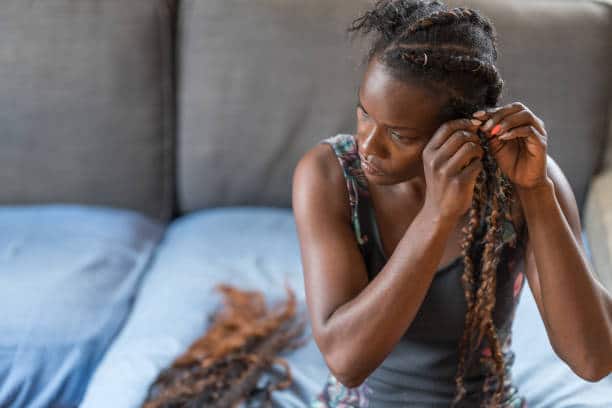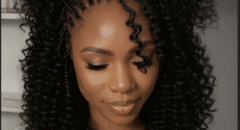
While a weave affords you a lot of versatility and protects your hair at the same time, you can't neglect your own hair while wearing one. Taking care of your hair when it's weaved away will ensure that once the weave is removed, your new growth is healthy and lush.
Anyone can wear weaves and still have healthy hair. You just have to take the time to show your natural hair and the weave some TLC.
Here's how to do it.
Prepare Your Hair and Scalp
Get your hair in good shape before adding extensions. Take a break from the weakening chemicals in curl relaxers or dyes to get a head start in avoiding breakage. Ensure your hair is clean, well-conditioned, and free of buildup from dead skin cells and styling products like hairspray. These can cause dryness, flaking, and itching.
If your scalp is dry and flaky, use a medicated shampoo that contains zinc pyrithione or selenium sulfide, concentrating the suds on your scalp. Leave it on for 15 minutes and rinse out. Then wash once more with regular shampoo and condition. Do this once a week for four weeks. If you're still seeing flakes, visit a dermatologist before getting extensions. You may have seborrheic dermatitis, which can be harder to control when you have extensions.
Apply Oils to Your Scalp
Your hair and scalp still need nourishment. Work natural oils beneath the weave onto your scalp and massage them in. If the weave is made of human hair, getting a little product on it won't hurt it, but synthetic hair doesn't require additional products, so you'll have to be careful not to get oils on it.
RELATED: All Natural Scalp Detox Recipe (Just 3 Ingredients!)
Stay Loose
The biggest mistake that women make with extensions is wearing them too tight. This puts a lot of tension on the hair follicles, which can cause your hair to fall out. At worst, it can contribute to the most common type of permanent hair loss in Black women.
Getting extensions should not be painful or cause headaches. If it does, they're too snug. Speak up! Ask your stylist to loosen them before continuing. Clip-ins are the least damaging extensions because they can be removed quickly and require little to no glue or braiding. But they can cause hair breakage if they pull or snag your hair, so put them in loosely.
Don't Skimp on Shampooing
Gently shampoo at least once a week to keep your scalp at its healthiest. This reduces the buildup of styling products used for extensions and dead skin cells. If you wear clip-in extensions, remove them first. Clean and dry them separately before reattaching. If your weave or extensions are sewn, bonded, or glued into your hair, separate your natural hair from them as best you can. Then wash, rinse, and condition your real hair separately from your faux hair. Towel-dry gently before you comb through or blow-dry.
Don't Overdo It
Even if they still look neat and polished, don't wear hair extensions for more than six weeks at a time. Weaves should be removed to allow for a thorough cleaning of the scalp and deep conditioning of the hair.
RELATED: The Best Natural Oils For Your Hair Type
Take Care When Taking Extensions Out
The glue used to secure hair extensions to your head contains chemicals that can cause hair loss. If bonding glue is necessary, use bonding glue remover to remove the extensions and ensure no glue remains in the hair. Any remaining glue can adhere to the hair and become nearly impossible to remove without losing hair in the process.
If your hairline or scalp itches after your weave is removed, you may have an allergic reaction. Formaldehyde is used to preserve hair weaves, and it sometimes causes irritation. See a dermatologist. They can treat an itchy or irritated scalp.
Give Your Hair a Break
Forgo extensions for a few weeks while you baby your hair and scalp to give it a break. Switch to a hairdo that puts less stress on your hair. Then you can put the extensions back into healthy hair.
Visit the BlackDoctor.org Hair Care center for more helpful articles and tips.









